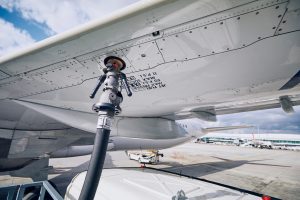Why Do We Want To Build The Ultimate Source For Crazy Aviation Facts?
Frank answer: Actually, there is no reason. The aviation industry certainly is one of my favorite sectors. Moreover, I have been fascinated by this vibrant industry for ages. So, from time to time, we’ve talked about fascinating aviation facts at the office. And one day, we had the idea of collecting all the facts and building the ultimate source.
Aren’t There Many Web Pages That Provide Aviation Facts?
Sure, there are plenty. That’s why we do it differently. First, we plan to add two aviation facts to this blog page every working day. That sums up to approximately 500 information pieces a year.
BUT! On top of that and together with my colleague Robin, I will do a daily video show to present the two fresh aviation facts. We will publish each video on YouTube and IGTV.
It is up to you to decide: You can read this blog post, or if you are more visual, you should check out our videos.
It’s Also A Little Batlle!
Now, since each day Robin and I will present an aviation fact, there’s, of course, a little battle going on: How provides the crazier aviation facts. That’s why we would love to get your feedback! Leave a comment on this page, or directly add a comment on YouTube or Instagram TV.
So, Here Are The Craziest Aviation Facts
The average cruising altitude of a commercial plane still is approximately 90,000m below the Kármán line — which is defined as the official border between the earth’s surface and outer space.

One of my favorite aviation facts: 95% of the world’s population has never been on a flight. That means 7,410,000,000 people have never boarded an airplane.
The atmosphere in an airline cabin reduces your ability to detect tastes by about 30 percent—think of it as your taste buds go numb.
In 1987 American Airlines saved $40,000 annually by removing one olive from the first-class salads.

The reason why airlines dim the cabin light during night flight isn’t solely about letting passengers sleeper tighter. It creates a safer environment by making the emergency exits easier for passengers to find while also allowing passengers to adjust their vision if an emergency occurs.
80% of the world’s population is afraid of flying — so-called aerophobia.
The bacteria levels of tap water is 100 times the amount of allowed bacteria levels in the United Stats!
Alaska Airlines was the first airline that introduced online check in 1999.
The highest price that’s has ever been paid for a flight ticket is $123,000. An Australian millionaire pought that ticket for a flight from Singapore to Sydney in 2007 — at it was the maiden flight of the A380.
The likelihood that a man cries when watching a movie on an airplane is 15% higher to when watching the movie on ground.
The safest section of an aircraft is the back third. The fatality rate of passengers is “only” 32% — whereas mid and front third the fatalitiy rate is ~38%. So make sure to chose a seat at the back!
225 kilometers! Inside of a 747 aircraft 225 kilometres of cable are routed.
The first transatlantic flight took place in 1919. Operated by the US NAVY the flight took 24 days!
Qantas Airways was the first airline in the world that introduced the business class — in 1979
With almost 80,000 flights in one year the route Seoul – Jeju is the busiest route in the world.
The tray table is the dirtiest place on an airplane. The bacteria levels found on tray tables is even three times as high as levels on toilet flush button.
1919 was the year when food was served on a plane for the first time. This happended on a trip from London to Paris. However, the sandwich wasn’t for free but cost 3 Schlling back then.
Safety is first! That’s why (at many airlines) pilots are not allowed to have a beard because it could cause problems when wearing the oxygen mask.
In order to simulate bird strikes, airlines use so-called “Chicken Guns” to shoot dead chickens straight into the engine.
The likelihood that your flight crashes is extremely low. Actually this likeliness is about 0.000024%
Up to now, 5.6 Billion people have travelled on a Boeing 747 aircraft!
Instead of capacity >300, the maximum capacity of the Air Force One is 96 people — including crew!
Although pretty close to each other, Hong Kong — Tapei is the busiest international route.
Up to today, 78 billion kilometers have been logged on all flights with a 747 aircraft. That’s 100,000 times to the moon and back!
In 2019, 1.7 Million bags were lost worldwide! And lost really means lost. That doesn’t include the mishandled bags that were delivered late!
Although it’s still a common myth, the Bermuda trianlge doesn’t play a role for commercial flights. Airlines no longer avoid that area.
On average the human body loses 1.5 liters of water on a 3 hour flight!
80% of all plane crashes happen during take-off and landing.
In 1947 an jetplane broke the sound barrier for the first time.
The amount of fuel that goes into a Boeing 747 could fuel 1,400 mini vans!





